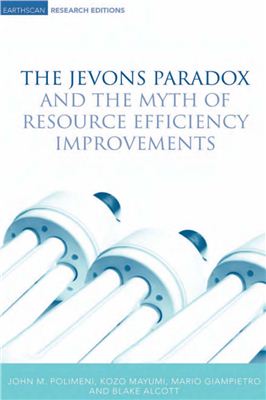Earthscan, UK and USA, 2008.
ISBN 978-1-84407-462-4.
P. 201.
In his 1865 work The Coal Question, William Stanley Jevons (1835–1882) expressed the conce that Britain would lose its economic dynamism and preeminence in the world due to an inevitable depletion of its reserves of easily mined coal. Of course he did not foresee the dominance of petroleum, even denying its likelihood, and so the central worry of the book tued out to be misplaced. But The Coal Question contains a gem that enshrines the book as among the most significant works of resource economics. That gem is known today as the Jevons Paradox. It cannot be expressed better than in Jevons’s own Victorian prose:
It is wholly a confusion of ideas to suppose that the economical use of fuel is equivalent to a diminished consumption. The very contrary is the truth. (Jevons, 1866, p123).
As a rule, new modes of economy will lead to an increase of consumption … (Jevons, 1866, p123).
Now, if the quantity of coal used in a blast-fuace, for instance, be diminished in comparison with the yield, the profits of the trade will increase, new capital will be attracted, the price of pig-iron will fall, but the demand for it increase; and eventually the greater number of fuaces will more than make up for the diminished consumption of each. (Jevons, 1866, p124–125).
In short, as technological improvements increase the efficiency with which a resource is used, total consumption of that resource may increase rather than decrease. This paradox has implications of the highest importance for the energy future of industrialized nations. It suggests that efficiency, conservation and technological improvement, the very things urged by those conceed for future energy supplies, may actually worsen our energy prospects.
Contents.
List of figures and tables.
Foreword by Joseph A. Tainter.
1 Introduction [John M. Polimeni, Mario Giampietro and Kozo Mayumi].
2 Historical Overview of the Jevons Paradox in the Literature [Blake Alcott].
3 The Jevons Paradox: The Evolution of Complex Adaptive Systems and the Challenge for Scientific Analysis [Mario Giampietro and Kozo Mayumi].
4 Empirical Evidence for the Jevons Paradox [John M. Polimeni].
5 Conclusion [John M. Polimeni, Mario Giampietro and Kozo Mayumi].
Index.
ISBN 978-1-84407-462-4.
P. 201.
In his 1865 work The Coal Question, William Stanley Jevons (1835–1882) expressed the conce that Britain would lose its economic dynamism and preeminence in the world due to an inevitable depletion of its reserves of easily mined coal. Of course he did not foresee the dominance of petroleum, even denying its likelihood, and so the central worry of the book tued out to be misplaced. But The Coal Question contains a gem that enshrines the book as among the most significant works of resource economics. That gem is known today as the Jevons Paradox. It cannot be expressed better than in Jevons’s own Victorian prose:
It is wholly a confusion of ideas to suppose that the economical use of fuel is equivalent to a diminished consumption. The very contrary is the truth. (Jevons, 1866, p123).
As a rule, new modes of economy will lead to an increase of consumption … (Jevons, 1866, p123).
Now, if the quantity of coal used in a blast-fuace, for instance, be diminished in comparison with the yield, the profits of the trade will increase, new capital will be attracted, the price of pig-iron will fall, but the demand for it increase; and eventually the greater number of fuaces will more than make up for the diminished consumption of each. (Jevons, 1866, p124–125).
In short, as technological improvements increase the efficiency with which a resource is used, total consumption of that resource may increase rather than decrease. This paradox has implications of the highest importance for the energy future of industrialized nations. It suggests that efficiency, conservation and technological improvement, the very things urged by those conceed for future energy supplies, may actually worsen our energy prospects.
Contents.
List of figures and tables.
Foreword by Joseph A. Tainter.
1 Introduction [John M. Polimeni, Mario Giampietro and Kozo Mayumi].
2 Historical Overview of the Jevons Paradox in the Literature [Blake Alcott].
3 The Jevons Paradox: The Evolution of Complex Adaptive Systems and the Challenge for Scientific Analysis [Mario Giampietro and Kozo Mayumi].
4 Empirical Evidence for the Jevons Paradox [John M. Polimeni].
5 Conclusion [John M. Polimeni, Mario Giampietro and Kozo Mayumi].
Index.

